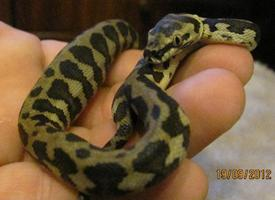
Váhy a míry
| Délka | od 5 do 6 m |
|---|
Popis zvířete
The Reticulated Python (Python reticulatus) is a species of python found in South and Southeast Asia. Known for being one of the longest snakes in the world, this magnificent creature has captivated both fear and fascination among humans. Its name, "reticulated," derives from the intricate, net-like pattern of its skin, which showcases a stunning array of colors that can include shades of brown, green, tan, and black, all crisscrossed with a complex network of yellowish or white lines. This distinctive pattern not only adds to the python's aesthetic appeal but also serves as an effective camouflage in the dappled light of its natural habitat.Adult Reticulated Pythons are massive and muscular, with females generally larger than males. They can reach lengths of more than 20 feet (6 meters), with exceptional individuals recorded at lengths of up to 30 feet (9 meters), making them contenders for the title of the world's longest snake. Despite their size, they are known for their swimming ability and can be found in a variety of aquatic habitats, including rivers and lakes.
The Reticulated Python is a non-venomous constrictor, relying on its immense strength to subdue prey. It preys on a variety of animals, including rodents, birds, and occasionally larger mammals such as monkeys, pigs, and deer. The snake uses its sharp, rearward-pointing teeth to seize its prey before wrapping its powerful body around the victim, constricting it until suffocation occurs. This method allows the python to tackle prey much larger than itself.
Reproduction in Reticulated Pythons involves oviparous (egg-laying) reproduction. Females lay clutches of up to 100 eggs, which they incubate through a process known as shivering thermogenesis, where the female contracts her muscles to generate heat and maintain a suitable incubation temperature. After an incubation period of around 88 days, the eggs hatch, and the juveniles are born fully independent, ready to fend for themselves.
Despite their intimidating size and predatory nature, Reticulated Pythons are not typically a threat to humans and are known to be shy and reclusive. However, instances of attacks on humans are not unheard of, primarily in situations where the snake feels threatened or is provoked. In some regions, they are hunted for their skin, meat, and for the exotic pet trade, although their population is not currently considered endangered.
Reticulated Pythons inhabit a range of environments, from forests to grasslands, and their adaptability has allowed them to thrive even in areas impacted by human activity. However, habitat destruction and the illegal wildlife trade pose significant threats to their populations in the wild.
In conclusion, the Reticulated Python is a fascinating and complex creature, embodying both beauty and power. Its role in the ecosystem as a top predator is crucial, helping to control populations of various prey species. As with many of nature's wonders, it is essential to understand and respect this magnificent animal, ensuring its survival for future generations to marvel at and learn from.
Podobná zvířata
Nové fotografie zvířat
Top 10 zvířat
- Dolphin gull (Leucophaeus scoresbii)
- Diana monkey (Cercopithecus diana)
- Stone loach (Barbatula barbatula)
- Greek tortoise (Testudo graeca)
- Japanese macaque (Macaca fuscata)
- Moustached guenon (Cercopithecus cephus)
- Galápagos tortoise (Geochelone nigra complex)
- Russian tortoise (Testudo horsfieldii)
- Galápagos penguin (Spheniscus mendiculus)
- Common flying dragon (Draco volans)


